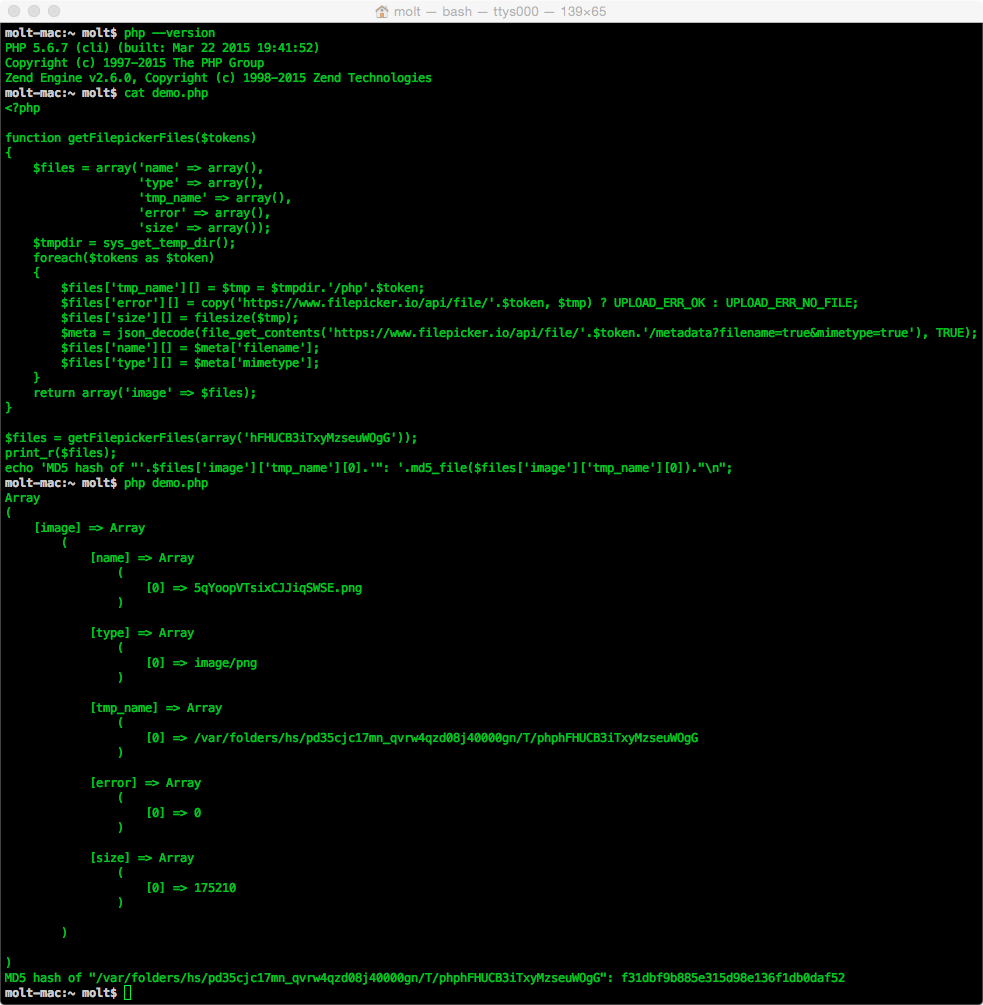Assuming you are using PHP 5.2.1 or higher and can use the HTTPS stream wrapper in copy() and file_get_contents(), this function should be all you need:
function getFilepickerFiles($tokens)
{
$files = array('name' => array(),
'type' => array(),
'tmp_name' => array(),
'error' => array(),
'size' => array());
$tmpdir = sys_get_temp_dir();
foreach($tokens as $token)
{
$files['tmp_name'][] = $tmp = $tmpdir.'/php'.$token;
$files['error'][] = copy('https://www.filepicker.io/api/file/'.$token, $tmp) ? UPLOAD_ERR_OK : UPLOAD_ERR_NO_FILE;
$files['size'][] = filesize($tmp);
$meta = json_decode(file_get_contents('https://www.filepicker.io/api/file/'.$token.'/metadata?filename=true&mimetype=true'), TRUE);
$files['name'][] = $meta['filename'];
$files['type'][] = $meta['mimetype'];
}
return array('image' => $files);
}
This function takes an array of tokens (such as hFHUCB3iTxyMzseuWOgG) as argument.
You can call it like
getFilepickerFiles(array('hFHUCB3iTxyMzseuWOgG'));
I don't know exactly what Filepicker passes to your server, but if it is a full file URL like
https://www.filepicker.io/api/file/hFHUCB3iTxyMzseuWOgG
then you can extract the tokens like this:
$tokens = array();
foreach($urls as $url)
{
$matches = array();
preg_match('# ^https://www\\.filepicker\\.io/api/file/([^/]*)/?', $url, $matches);
$tokens[] = $matches[1];
}
// Pass $tokens to getFilepickerFiles()
You could also put that right into getFilepickerFiles() to make it take an array of file URLs instead:
function getFilepickerFiles($urls)
{
$files = array('name' => array(),
'type' => array(),
'tmp_name' => array(),
'error' => array(),
'size' => array());
$tmpdir = sys_get_temp_dir();
foreach($urls as $url)
{
$matches = array();
preg_match('# ^https://www\\.filepicker\\.io/api/file/([^/]*)/?', $url, $matches);
$token = $matches[1];
$files['tmp_name'][] = $tmp = $tmpdir.'/php'.$token;
$files['error'][] = copy('https://www.filepicker.io/api/file/'.$token, $tmp) ? UPLOAD_ERR_OK : UPLOAD_ERR_NO_FILE;
$files['size'][] = filesize($tmp);
$meta = json_decode(file_get_contents('https://www.filepicker.io/api/file/'.$token.'/metadata?filename=true&mimetype=true'), TRUE);
$files['name'][] = $meta['filename'];
$files['type'][] = $meta['mimetype'];
}
return array('image' => $files);
}
Explanation
I feel like the above code is rather straightforward, but here's how getFilepickerFiles() works (you should have read the Rest API documentation before reading this):
$files = array('name' => array(),
'type' => array(),
'tmp_name' => array(),
'error' => array(),
'size' => array());
Initialize $files to an array like $_FILES containing no files.
$tmpdir = sys_get_temp_dir();
Get the directory where temporary files are stored, because we're gonna download the files to there (this function requires PHP 5.2.1 or higher).
foreach($urls as $url)
What foreach does should be clear.
$files['tmp_name'][] = $tmp = $tmpdir.'/php'.$token;
Build our temporary file path, following the pattern of $_FILES (i.e. the path of the temporary files folder, the string "php", and some random characters).
That name we assign to $tmp (for easy later use) and we add it to the list of file paths.
$files['error'][] = (int)(!copy('https://www.filepicker.io/api/file/'.$token, $tmp));
Attempt to download the file to $tmp by using copy() with a URL as source.
The value returned by copy() is TRUE on success and FALSE on failure.
The error values present in $_FILES are UPLOAD_ERR_OK on success and any other value otherwise (source, I am going with UPLOAD_ERR_NO_FILE here in case of failure).
So in order to assign a meaningful error value, we use the ternary operator to add UPLOAD_ERR_OK to the list of error codes if copy() returns TRUE, and UPLOAD_ERR_NO_FILE otherwise.
$files['size'][] = filesize($tmp);
Query the file's size and add it to the list of file sizes.
$meta = json_decode(file_get_contents('https://www.filepicker.io/api/file/'.$token.'/metadata?filename=true&mimetype=true'), TRUE);
Get file metadata by using an URL as argument to file_get_contents(), which should return a JSON array that we decode into an associative array using json_decode(/*...*/, TRUE).
Since we appended &filename=true&mimetype=true to the end of the URL, we will only get the values filename and mimetype - we don't need all the rest.
The decoded array we assign to $meta;
$files['name'][] = $meta['filename'];
$files['type'][] = $meta['mimetype'];
Add the values filename and mimetype from the just decoded JSON array to the lists of file names and mime types respectively.
return array('image' => $files);
Return an array with the image key pointing to the array of files we created.
And we're done.
Demo? :(
I am not going to build an entire file hosting website for this, because it would take five times the amount of time I needed to write this answer.
So I'm afraid I can't provide you with a fully working live demo.
Unfortunately, neither 3v4l nor codepad have the HTTPS stream wrapper enabled, so I am not even able to provide you with a "see-for-yourself" proof of concept demo.
The best I can do is probably a screenshot of my terminal window (click to enlarge):
![enter image description here]()

